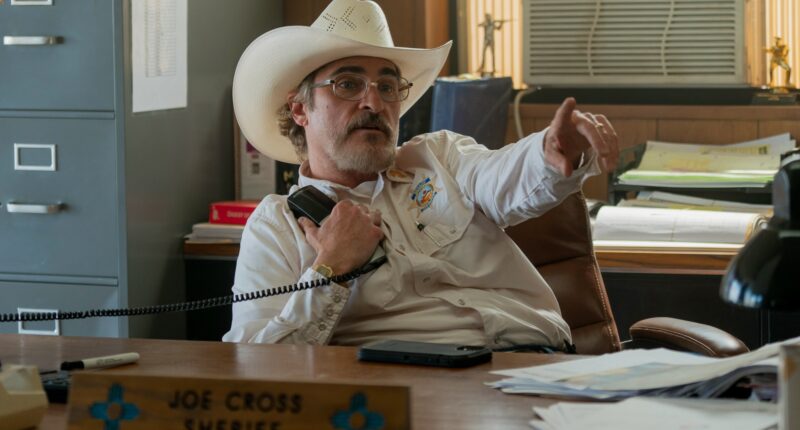It’s brutal, cynical, mean-spirited, and a tad esoteric. But Aster is clearly attempting to say something scathing about America and the men like Joe who populate it. So join us as we unpack the real intent of Eddington once you get past the culture war noise that brought Joe and Dawn together for that bitterest of endings.
The Lie of “Both Sides”
At a special screening of Eddington that I attended, Aster was on hand to answer questions, including a surprisingly candid, if guarded, explanation of the film’s depiction of modern American tribalism. “On one side you have people who might annoy you,” Aster mused, “but on the other are those who terrify you.” Such is the truth of America’s false equivalency. And unsurprisingly, Aster interrogates it like a sadist staring at a car wreck.
At first Eddington appears to be a sober-eyed and deliberately uncomfortable recreation of events that occurred only half a decade ago. That isn’t so much time, but the daily miseries of COVID have been so collectively memory-holed that I personally felt a shiver of trauma while watching Joe Cross get his nasal cavities scrubbed at a drive-thru test site. Other aspects of those terrible days have never left us, however, including the cultural divide embodied by Joe and Eddington’s smarmy mayor, Ted Garcia (Pedro Pascal).
The pair make a striking divide: Joe in his cowboy hat, Garcia in his N95 mask even while standing outside. Admittedly, these sequences take place in the summer of 2020, back before we realized it was highly unlikely for COVID to be spread in an outdoor space. With a certain degree of hindsight, both Joe and Ted make what are in retrospect valid points in some scenes, and supercilious ones in others. As it turns out, COVID probably did begin in a Wuhan lab. Still, the wealthy countries that practiced stricter social distancing saw fewer per capita deaths from the virus than the notoriously divided U.S.
As is Aster’s wont, we find humanity and frustration in both men, such as the fact that Joe is treated like a monster by his neighbors for being asthmatic and not wearing a mask in public, yet also then glibly (and wrongly) claiming online that “COVID isn’t here.” Meanwhile Ted is trying to explain the verifiable science of the day to a sheriff who chooses to be willfully ignorant, but the mayor is also throwing parties where folks take off their masks to drink booze and eat food. Ted’s even not above using his wife leaving him as political capital in campaign ads, despite it clearly hurting his teenage son.
The movie’s first act carefully sets the table for many similar cultural fault lines that allow you to feel frustration with “both sides.” There are for example, the local high schoolers who get swept up in the antiracist “reckoning” of the summer of protests, some of which because their hearts are in the right place like Sarah (Amélie Hoeferle), and some because it gives them social popularity, a la Brian (Cameron Mann). The latter has such a crush on the former that he repeats her tumblr-transcribed talking points at his parents’ dinner table, clearly parroting but not understanding what he means by “eradicating whiteness.” Sarah and Brian are of course both white, and both determined to speak on behalf of (and over) the marginalized and oppressed communities they claim to champion.








